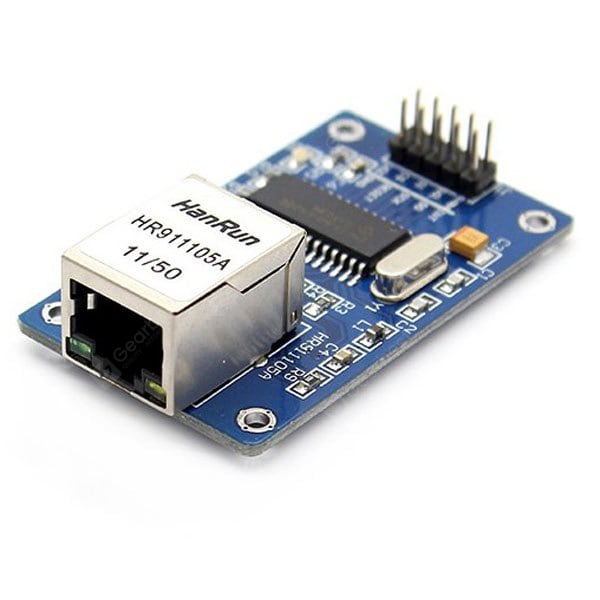Mbed library for ENC28J60 Ethernet modules. Full support for TCP/IP and UDP Server, Client and HTTP server (webserver). DHCP and DNS is included.
Dependents: mBuino_ENC28_MQTT Nucleo_Web_ENC28J60 Nucleo_Web_ENC28J60_ADC Serial_over_Ethernet ... more
Library for ENC28J60 Ethernet modules.

Ported to mbed from Norbert Truchsess's UIPEthernet library for Arduino. Thank you Norbert!
- Full support for persistent (streaming) TCP/IP and UDP connections Client and Server each, ARP, ICMP, DHCP and DNS.
- Works with both Mbed OS 2 and Mbed OS 5.
Usage:
- Import the library into your project.
- Add
#include "UipEthernet.h"tomain.cpp - Create one instance of the UipEthernet class initialized with the MAC address you'd like to use and SPI pins of the connected Mbed board.
Example programs:
Import programWebSwitch_ENC28J60
HTTP Server serving a simple webpage which enables to remotely turn a digital output on/off. Compile, download, run and type 'IP_address/secret/' (don't forget the last '/') into your web browser and hit ENTER.
Import programHTTPServer_Echo_ENC28J60
A simple HTTP server echoing received requests. Ethernet connection is over an ENC28J60 board. Usage: Type the server's IP address into you web browser and hit <ENTER>.
Import programTcpServer_ENC28J60
Simple TCP/IP Server using the UIPEthernet library for ENC28J60 Ethernet boards.
Import programTcpClient_ENC28J60
Simple TCP/IP Client using the UIPEthernet library for ENC28J60 Ethernet boards.
Import programUdpServer_ENC28J60
Simple UDP Server using the UIPEthernet library for ENC28J60 Ethernet boards.
Import programUdpClient_ENC28J60
Simple UDP Client using the UIPEthernet library for ENC28J60 Ethernet boards.
Import programMQTT_Hello_ENC28J60
MQTT Client example program. Ethernet connection is via an ENC28J60 module.
Diff: Dhcp.cpp
- Revision:
- 4:d774541a34da
- Parent:
- 2:049ce85163c5
- Child:
- 6:10e42359e217
--- a/Dhcp.cpp Sat Dec 20 11:10:40 2014 +0000
+++ b/Dhcp.cpp Sun Mar 08 20:26:56 2015 +0000
@@ -3,8 +3,8 @@
#include <string.h>
#include <stdlib.h>
#include "Dhcp.h"
-#include "utility/util.h"
-#include "utility/uip_clock.h"
+#include "utility/util.h"
+#include "utility/millis.h"
/**
* @brief
@@ -62,19 +62,19 @@
int result = 0;
- unsigned long startTime = clock_time();
+ unsigned long startTime = millis();
while(_dhcp_state != STATE_DHCP_LEASED) {
if(_dhcp_state == STATE_DHCP_START) {
_dhcpTransactionId++;
- send_DHCP_MESSAGE(DHCP_DISCOVER, ((clock_time() - startTime) / 1000));
+ send_DHCP_MESSAGE(DHCP_DISCOVER, ((millis() - startTime) / 1000));
_dhcp_state = STATE_DHCP_DISCOVER;
}
else
if(_dhcp_state == STATE_DHCP_REREQUEST) {
_dhcpTransactionId++;
- send_DHCP_MESSAGE(DHCP_REQUEST, ((clock_time() - startTime) / 1000));
+ send_DHCP_MESSAGE(DHCP_REQUEST, ((millis() - startTime) / 1000));
_dhcp_state = STATE_DHCP_REQUEST;
}
else
@@ -86,7 +86,7 @@
// We'll use the transaction ID that the offer came with,
// rather than the one we were up to
_dhcpTransactionId = respId;
- send_DHCP_MESSAGE(DHCP_REQUEST, ((clock_time() - startTime) / 1000));
+ send_DHCP_MESSAGE(DHCP_REQUEST, ((millis() - startTime) / 1000));
_dhcp_state = STATE_DHCP_REQUEST;
}
}
@@ -129,7 +129,7 @@
_dhcp_state = STATE_DHCP_START;
}
- if(result != 1 && ((clock_time() - startTime) > _timeout))
+ if(result != 1 && ((millis() - startTime) > _timeout))
break;
}
@@ -279,14 +279,14 @@
uint8_t type = 0;
uint8_t opt_len = 0;
- unsigned long startTime = clock_time();
+ unsigned long startTime = millis();
while(_dhcpUdpSocket.parsePacket() <= 0) {
- if((clock_time() - startTime) > responseTimeout) {
+ if((millis() - startTime) > responseTimeout) {
return 255;
}
- wait(0.050);
+ wait_ms(50);
}
// start reading in the packet
@@ -412,7 +412,7 @@
int DhcpClass::checkLease(void) {
//this uses a signed / unsigned trick to deal with millis overflow
- unsigned long now = clock_time();
+ unsigned long now = millis();
signed long snow = (long)now;
int rc = DHCP_CHECK_NONE;
if(_lastCheck != 0) {
